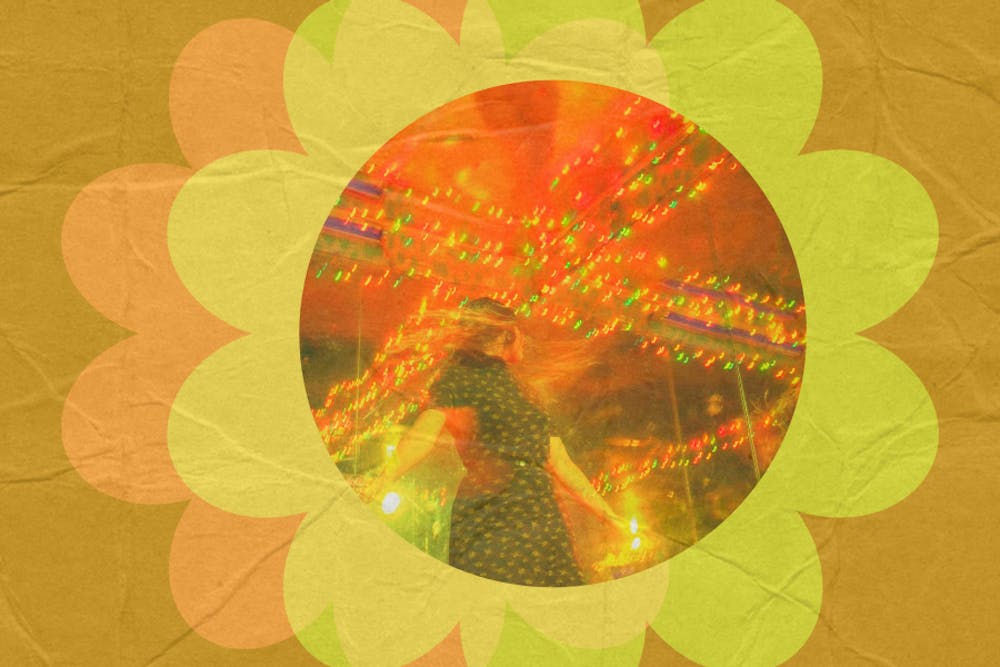Renée Reed’s self–titled debut album hovers like a will–o’–the–wisp over the Louisiana bayou. She comes off as a naturally gifted musician across these 12 songs, culled from only the first fifteen she ever recorded on four—track. At least part of this talent can be attributed to her relatives: an accordionist grandfather and a great uncle who catalogued traditional regional songs. Reed is well aware of her music’s inextricable ties to the culture in her hometown of Lafayette, La.; she described the project as “dream—fi folk from Cajun prairies.” In that sense, Renée Reed is unified with its surroundings, but deftly walks the tightrope between honoring and transcending its legacy.
On the cover art for the first single “Out Loud,” Reed dresses in the traditional garb for the celebration of courir de Mardi Gras. Her use of Creole iconography lends further eeriness to music that already feels haunted—just look closely at the googly eyes and oversized lips plastered atop her face. “Out Loud” opens the album and is a fitting portrait for the songs that follow. Reed sings, “Deep in the corner I tell all your secrets out loud,” but has little intention of revealing her own. As a guitar–toting female singer, she could be misconstrued as confessional when she seems far more intent on cultivating an aura of mystery.
Renée Reed also demonstrates clear influences that exist outside the realm of regional Cajun music. These songs have the same sense of being conjured—rather than composed—that Adrienne Lenker managed to capture on her songs / instrumentals releases last year. That said, the artist who Reed has been most likened to is Jessica Pratt, another singer and guitarist known for her keening voice. Admittedly, this album does share an affinity for hypnotic finger–plucked guitar patterns that flit effortlessly between minor and major keys with Pratt’s self–titled debut.
Still, this new release clearly deviates from Pratt’s music. For example, Reed tends to double–track her own voice and underscore her arrangements with droning low tones. Both of these production techniques make her songs deeper, warmer, and richer. And while Jessica Pratt sounds like she’s singing in the same room as you, the entirety of Renée Reed is drenched in reverb like it was recorded inside of a cathedral. The languid ballad “If Only We Could” echoes so that you can hear each note as it disappears, creating a hazy shimmer not unlike Liz Harris created in Grouper.
Most of the songs on Renée Reed exist in their own otherworldly realm. “Où est la fée” is a dark folktale told over an organ on its last legs, whose chorus translates to “Where is the fairy? It’s in the head.” “Fast One” is a highlight on the album and one of the best songs of the year so far. It has a meditative and dreamlike quality that hews closest to Reed’s label of “dream–fi folk.” While these mystical passages are the most transfixing, other portions of this record are engagingly steeped in Acadian sounds. Both “I Saw a Ghost” and “Until Tomorrow” are bluesier numbers that owe a debt to the French yé–yé pop movement. They wouldn’t sound out of place on the soundtrack of a TV show like True Blood.
“Drunken Widow’s Waltz” is a jarring closer. It’s upbeat and staccato, and features a clackety drum machine—the only trace of percussion on the album. The song is reverent towards the origins of Renée Reed’s musicianship, with lyrics that memorialize her grandparents, sung in Cajun French. Her performance can come off abrasive at first, since it surrenders the elegant melodic turns and lilting delivery of the preceding “Fool to the Fire” for something that sounds like it should be blaring out of a gramophone. If Reed’s songwriting suddenly feels old–timey, that’s because she is enough of a Cajun musical scholar to produce a song that sounds really tied to that time and place.
This album rewards the kind of listener who can be thrilled by subtlety, whether that’s a clever key change, a touch of vibrato, or a slight increase or decrease in reverb. A song like “The Ash” spins a narrative of romantic tension (“I’ll set you free / I’ll let you breathe this time”) but strips away any concrete touchstones. Our unanswered questions let Reed’s words fade into the texture of her songs in a manner not so distant from Cocteau Twins’ Elizabeth Fraser. The stories spun on Renée Reed are like hushed tales told around a campfire—the atmosphere makes them all the more enthralling. And if you just lean in a little closer, Reed will finally tell you all of her secrets.







